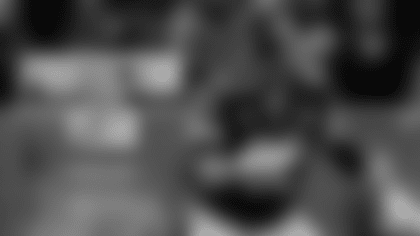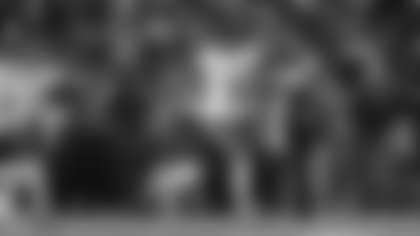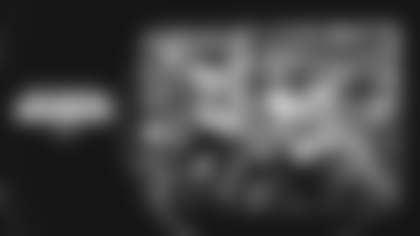Bears have coped with generational events before
Story by Nathan Smith
Though it may have seemed in doubt six months ago, when the nation entered lockdown and COVID-19 took hold in the United States, the NFL season has begun.
This season will be played over perhaps the most tumultuous landscape in living memory. Many games will be played in empty stadiums, in the context of a divisive presidential election and a national reckoning about police brutality and racial inequity.
One could be forgiven for hoping that football would remain separate from outside events, a weekly respite from the outside world's stress. However, football, and more specifically, the NFL, has never been able to fully quarantine itself from what is happening in the nation at large.
The sport was invented by Civil War veterans, hoping to instill what they saw as the positive effects of military service without the bloodshed. The NFL sprung up in the aftermath of World War I and the 1918 influenza pandemic.
The young men who pioneered the league, including George Halas and Dutch Sternaman, were fresh off military service in World War I. Their cohorts, those born between 1883 and 1900, have the dubious distinction of being the first generation to get a name: the Lost Generation.
The term was coined by Gertrude Stein and popularized by Ernest Hemingway, an Oak Park native who played football in his youth.
"Football, like the war, was unpleasant," Hemingway wrote in his novella "The Torrents of Spring," "stimulating and exciting after you had attained a certain hardness."
Halas did not see combat in World War I. Stationed stateside, he participated in the organized football league of the military. The experience is sometimes cited as a catalyst for the idea of post-collegiate football that took hold of Halas.
The history of the Chicago Bears has been woven into the last century of the United States' history, for good and ill. Last season, the team acknowledged its complicity in the league's unofficial segregation from 1934 to 1945. Two decades later, the team became a symbol of racial healing and triumph over tragedy through the unlikely friendship between Gale Sayers and Brian Piccolo.
Players can quarantine themselves against a virus, but they cannot disconnect themselves from the world.
"The advice was never 'tune out,'" said retired Bears guard Tom Thayer. "You can never go in to play a professional sport unfocused, but during the different times that you have in the course of a player's day where you have those open minutes, you talk about everything."
This becomes more salient in light of generational events. Just as the Lost Generation became defined by the experience of the First World War, the Greatest, or GI, Generation became defined by the second.
The Great Depression and declining birthrate gave rise to the Silent Generation. The post-war Baby Boom gave the next generation their name, though the signature memory of that Generation became the assassination of President John F. Kennedy. Those who could not remember the event became known as Generation X, whose defining tragedy was the Challenger Space Shuttle disaster. Proximity to the new millennium was supposed to define the next cohort. Instead, it was the September 11 attacks 21 months later.
It seems likely that we are in such a moment right now, where consciousness of this year will separate young adults and adolescents from those too young to understand.
That is the backdrop for the Chicago Bears this season. Nearly every press conference in training camp required players and coaches to address outside events in some way. However, the benefit of working in a century-old institution is that there is always a lesson from the past.
“You can never go in to play a professional sport unfocused, but during the different times that you have in the course of a player’s day where you have those open minutes, you talk about everything.” Former Bears guard Tom Thayer
On Oct. 27, 1929, Red Grange completed a 16-yard touchdown pass to his younger brother Gardie to put the Bears up 27-0 against the Minneapolis Red Jackets. The Bears finished the shutout, climbing to 4-1-1 on the season. In a mere 24 hours, events would be set in motion that would swallow the country, the next decade, and the team the Bears had just defeated.
The next day is known as Black Monday; the day after would be called Black Tuesday. The stock market crashed, and the Great Depression began.
The Bears seemed to echo the national mood. Despite their status as perennial contenders, the team would not win another game until the next October. It should be noted that correlation is not causation.
"That was a coincidence," said Patrick McCaskey, a Bears vice president and Halas' grandson. "The Bears just weren't very good in 1929."
Halas retired as a player and coach after the season, retaining only his ownership stake. Conditions gradually worsened over the next three years. Halas famously borrowed and promised his way through and resumed coaching duties in 1932, a few months before the election of Franklin Roosevelt.
The team did not thrive in this period, but it did survive. Like the burgeoning movie industry, it became essential escapism from a decade of hardship.
"Halas heard firsthand from fans that sports can take people's minds off their troubles," said McCaskey, "at least for a few hours."
Years later in 1941, as fortunes began to turn for the franchise, the team traveled to the south side to end their regular season against the crosstown Cardinals. The team drubbed their rivals, reaching 10-1 on the season. Neither the teams on the field or the fans in the stands knew that around the same time, Japanese airplanes were carrying out a surprise attack on Pearl Harbor, dragging the United States in World War II.
Halas, unsatisfied with his involvement in the First World War, resigned as coach for a second time. He re-enlisted in the Navy and was stationed in the South Pacific in a non-combat role, but not before finishing off the 1941 season, winning the franchise's fourth NFL championship.
“[George] Halas heard firsthand from fans that sports can take people’s minds off their troubles, at least for a few hours.” Bears vice president Patrick McCaskey
The duo of Hunk Anderson and Luke Johnsos took over coaching duties while Halas communicated with his team via telegraph. They won another championship in 1943 before 19 of 28 players joined the war effort, including star quarterback Sid Luckman.
Luckman, a merchant marine, was present at D-Day, the battle that became the symbolic justification of the generational moniker "Greatest."
Like the rest of the country, the team celebrated the end of the deadliest war in human history. Halas' return restored the Bears to a state of normalcy, which, in those days, meant winning a lot of games. However, after the team's 1946 championship season, 17 years would pass before the next time the Bears won it all.
The 1963 team was primed for success, filled with some of the Silent Generation's most incredible talents, forged in that era's hardships. Veteran linebacker Bill George was born the same day the Bears defeated the Minneapolis Red Jackets in 1929, while young tight end Mike Ditka was born the month after Germany invaded Poland a decade later.
The Bears were well on their way to ending the championship drought when President John F. Kennedy was assassinated on Friday, Nov. 22, 1963.
There was no template for what the NFL should do in the event of a presidential assassination. The NFL didn't exist in 1901, the most recent time such an event had happened. Commissioner Pete Rozelle decided to play games as planned with the encouragement of White House Press Secretary Pierre Salinger and the deceased President's brother Robert.
"It has been traditional in sports for athletes to perform in times of great personal tragedy," said Rozelle.
While Rozelle would continue to lead the NFL for 26 more years, the decision to play games 48 hours removed from the most jarring event of the post-war era would become his most criticized decision.
The Bears tied the Steelers that day. On the bus, the team listened to live coverage of another shocking event: the shooting of the assassin Lee Harvey Oswald. For a tie, the game was memorable for its context and Ditka's 63-yard reception to set up the field goal that saved the team from a costly loss. Still, the memory of the game caused Chicago radio personality Chet Coppock to write 50 years later: "The question begs to be asked: Just why was the game and the rest of the NFL's Week 12 schedule played, period?"
The Bears went 23 years before winning another championship. The franchise broke through on January 26, 1986. The cultural sensation around the team peaked the day after, when the Bears held their victory parade on Monday morning in Chicago. One day later, the Space Shuttle Challenger broke apart shortly after launch, killing all seven crew members, including teacher Christa McAullife.
"It's kind of weird because you don't mean it selfishly," said Thayer. "It's just a reaction to it, but it took the Bears off the front page of the newspapers. That was such a disaster that overwhelmed the entire world."
Thayer notes one thing that separates 1986 from every other event previously discussed: by two days, the tragedy didn't occur during football season. The Bears had to delay their visit to the White House for 25 years, but the team didn't need to play through national grief.
The players that would face that challenge were on the 2001 team.
James "Big Cat" Williams arrived in Chicago as an undrafted defensive tackle. He switched sides of the ball to replace an injured Keith Van Horne, at a time when the young offensive line that paved the way for Walter Payton in 1985 began to age into retirement. By 2001, he was an established starter, months away from his first and only selection to the Pro Bowl.
"I remember us thinking that we were going to be pretty good," said Williams. "I remember thinking as a team, we had found something to rally behind as far as the threat of Dick Jauron losing his job."
Jauron came into the year with an 11-21 record, but he had reason to be optimistic.
The 2001 team was a meld of Gen-Xers. The team wouldn't add their first millennial, cornerback Charles Tillman, for another two years. While the team may have all fit within the same generation, there was a gulf between the young, budding superstars that would form the foundation of the defense that eventually would go to the Super Bowl and the assortment of veterans, like Williams, who were looking to make one last run.
The Sept. 11 attacks happened on a Tuesday morning: the players' day off. Williams woke up to news and took several minutes to comprehend that he wasn't seeing clips from a movie. Quarterback Jim Miller remembers being glued to the television all day. When he returned to Halas Hall, he found that there was no escape from the catastrophe.
"Everybody was talking about it," said Miller. "Your mind was always on it. Even then, the Bears had a cafeteria. When you got your workout done, you were going into the cafeteria where a TV was set up to get any bits of information that you could."
The 2001 team found themselves in a similar situation to what the 2020 team faced in August during the aftermath of the shooting of Jacob Blake in nearby Kenosha and the ensuing week of chaos. The question is implicit: what are we doing here?
"Let me say this: football is a game," said linebacker Robert Quinn after the team canceled practice on Aug. 27. "What we're talking about is real life."
Even if the coaching staff had tried to carry on, the 2001 Bears found little value to a practice when everyone involved is distracted.
"We were going through this walkthrough," said Miller, "and Dick Jauron called everybody up as a team. We started to go through it, but nobody's head was in it. Nobody was focused on that practice. I remember coach Jauron said, 'Hey, we're not getting anything accomplished today. Our work is done here today. Everybody go home.'"

In 2001, the team had 12 days to regroup after the single most destructive terrorist attack on American soil. Perhaps learning a lesson from Rozelle's regret, the NFL canceled Week 2 of the season, tacking those games onto the end of the regular season and returning to play in Week 3 as scheduled.
Still, that time was rife with the fear that another terrorist attack could occur at any time, that no large group was safe. Stadiums beefed up security in response.
"I remember leading up to it," said Williams, "listening to all the reports and all the possibilities on other things occurring, wondering, 'was it the best thing to do?' But realizing that it was bigger than us. It was an opportunity for people to do something else for a couple hours out of their day."
However, if the league learned from the mistakes of 1963, they may have discovered the rationale behind them. Football didn't heal the nation or end the despair. However, it did give some fans a few hours break from thinking about the chaos around them.
In the first game back against the Minnesota Vikings, Miller stepped in for injured starter Shane Matthews. In the fourth quarter, Miller threw two touchdowns to give the Bears a 17-10 victory, the first in a six-game winning streak. For the only time in his career, Miller became a full-time starter.
Once games were underway, both Miller and Williams remember the foreboding feeling ebb. Williams credits the rigorous and full schedule of an NFL player for taking away free time that might have been used to dwell on the tragedy. Similarly, though for different reasons, this year's team has generally been at Halas Hall from seven in the morning until nine at night.

In 2001, the team finished 13-3, the franchise's best record since 1986. Despite everything that happened, both Miller and Williams remember that team as one of the tightest-knit of their careers. Once the team found momentum, it became easy to rally around.
"It was a sense of normalcy," said Miller, "kind of like with what we're dealing with right now. Nothing seems normal. I think everybody's excited for the NFL season to start. It's just a small thing, with bigger events that are happening in the world, where you get a sense of normalcy."






